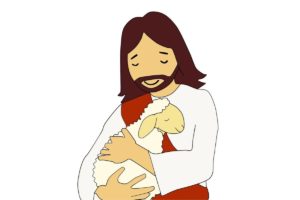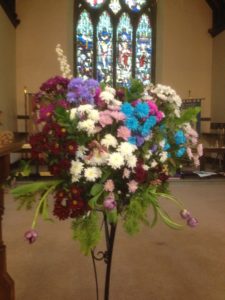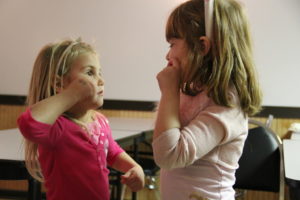The Sermon
By Canon Julian Sullivan
The Kindness of Strangers
We were once wrestling with a wardrobe outside St Luke’s Hospice Shop in NetherEdge, trying to fit it in the back of our car. We tried every which way, but it just would not go in. Frustrating!!! A gentle voice said behind me, “Excuse me but if you can wait five minutes while I collect my daughter from school, I’ll come back and that cupboard will easily go into the back of my VW Microbus and I’ll take it home for you!”
True to her word, she returned with her daughter and the wardrobe came home with ease! A young mum on a busy school run, gave the time to help a couple of strangers solve a problem. She will always be in our memory. Kindness multiplies. We were so pleased to solve our problem and she was pleased to help us so we all felt good, even her daughter, who wondered who these new friends were. Never underestimate the power of an act of kindness.
Bees
A few years ago, I took up bee-keeping. In one of the classes attended, a life long bee keeper was asked to say a few words to this group of rookie apiarists about his life with bees. “Eugene, if you could say one thing to the group, what would it be?” He paused a moment: “Love your bees; love your bees. Get to know their ways and learn to understand them. They will be a constant source of delight and always have something new to teach you.” Someone who had seen Eugene working with his bees described it as “poetry in motion.” He treated them gently, did not stress them or crash around when opening the hive, and moved slowly and deliberately as he inspected them. Did they have enough food and space, how were the young, and most importantly how was the queen, who sets the tempo in the hive. You could say he was like a good shepherd, who cared for the creatures in his care with kindness.
From Iona to Lindisfarne
Kindness has always had a place in the well being of neighbourhoods and has played a vital part in the spreading of the gospel of Christ. When king Oswald of Northumbria wanted to introduce the Christian faith to his kingdom in the North East, he called on the monks of Iona, to send someone to tell his people about the christian faith. A monk named Corman was duly dispatched to the region and set about trying to make converts to the faith. After some time he had made no headway and returned to Iona. He complained that the people were a miserable lot who wouldn’t listen to a word he said! Up stood a fellow monk who asked him, “Did you get to know the people, listen to their worries, offer to help with their day to day problems? (These were
turbulent times, with the threat of violence from sea and land.) He replied that he had not. Well what did you expect then, said the monk. You should have taken time to get to know them, to win their confidence and if possible their affection. Then they would have listened to you.
Hearing this, the abbot decided to send this young monk in Corman’s stead. He travelled to the North East from the Inner Hebrides and spent time among the people, getting to know them, listening, making friends, engaging wherever possible in local life. In so doing he won their hearts and not only did they listen to his message but they came to Christ in large numbers and the faith flourished in that region. The monk in question was called Aidan, the place where he based his mission was Lindisfarne, or Holy Island as it is known today and the rest is history.
Our Gospel
Which brings us neatly to our gospel reading in Mark 6 where we find Jesus and the disciples in the thick of it. In the midst of a lot of coming and going, with no leisure even to eat properly, Jesus had heard of the death of John, his cousin and was mourning his loss. But he was also thinking of the welfare of his disciples who needed, some relief from the demands of their very public ministry with Jesus. He listened carefully as they told him all they had done and taught and wanted to cut them some slack. It is very easy to drive ourselves and others hard, when the need is great. During the 90’s we undertook a major refurbishment in down town Bramall Lane. Looking back it was at times relentless, but we could have looked after each-other better, because by completion, some of us were very poorly indeed. We might have taken more notice of this passage where Christ put his disciples first and invited them away to a deserted place to rest and recuperate. We should have built in more parties and spaces to relax.
When they arrive by boat at the deserted place, they find it overrun with people. It was like Scarborough beach in the holiday season (Remember that?). They were desperate to see Jesus, and as he looked out on them, he saw that they were like sheep without a shepherd, and he responded with compassion. Compassion embraces patience and wisdom; kindness and perseverance; warmth and resolve. Jesus showed all these qualities in abundance which meant that he did not try to hide from the crowd, or escape, like celebrities do, but realising their needs, he engaged with them, responded to their needs and gave them a glimpse of the Kingdom of God. No one in that crowd will have forgotten that encounter with Jesus as they came away healed, affirmed, encouraged and enriched being in the presence of the one who said “I have come that you might have life; life in all its fullness.
The DNA of the Church
We took the train to London recently after a long break from travel of any kind. I resorted to my habit when on a train, of gazing out of the window as towns, village and countryside speed by.
As I did so, I noticed something as if for the first time: the number of church towers and spires often surrounded by trees, rising above their surroundings. I wondered who they were dedicated to and thought of how each spire represented a distinctive Christian community, a parish church, engaged in the ongoing life of their neighbourhood, taking their cue from the one who shared our life, living and dying to create a new humanity, Ransomed, healed, restored, forgiven. Who blessed those around him with those qualities of compassion and kindness, healing and forgiveness, reconciliation and the breaking down of barriers.
Ephesians
It is easy to under value the presence of a church in every community, woven into local history, playing a part in everyday life. Our reading from Ephesians contains what has been described as the new humanity of the people of God, modelling the quality of life of God’s kingdom. Speaking to Jews and Gentiles, Paul spells out the implications of what Christ has done:
“Christ is our peace ... breaking down the dividing wall, the hostility between us ... so that he might create in himself one new humanity in place of the two (Jew and Gentile) thus making peace. He describes the life of the young emerging church as having access to God through Christ - no longer strangers and aliens but citizens with the saints and members of the household of God ... built upon the foundation of the apostles and prophets, with Christ Jesus himself as the cornerstone ... joined together and growing into a holy temple in the lord ... in whom you are built together spiritually into a dwelling place for God.”
This is not directly talking about Gareth Southgate and the England football squad, although he almost could be, the confidence and respect they had in each other shone very brightly with such spirit within the squad: Solidarity, sportsmanship, a real sense of togetherness. But this is the DNA of the church to which we belong, of which we are the visible signs in this present age. We may be tempted to think that the church is a modern day irrelevance and it is true that much of what we do goes unnoticed and unreported, but hear what Ann Morisey said to us at one of our diocesan days:
“In every community, the church is likely to be the largest and most diverse membership organisation, the most significant generator of social capital, a significant source of adult education learning for daily life; the most grass root network of voluntary organisations; the most long lived, best able to tell the story of the neighbourhood. The most significant provider of community facilities. The parish is a tree of life and anchor for a complex ecology of community activity, a blessing to its neighbourhood and beyond. Adults and children can find their way within a living community of faith as part of the world wide church. It has a calling to be more than a gathered community of the faithful, to serve the need of all, work for the good of all and communicate the gospel to everyone.”
St Mary’s Walkley
We can set alongside Ann Morisy, the way in which you describe your own aspirations here at St Mary’s Walkley:
We see ourselves as a church that welcomes and includes everyone, in their uniqueness, lifting the lowly, feeding the hungry as only the body of Christ can. As Christ’s people, we aspire to be agents of God’s healing grace, offering the ‘balm of Jesus Christ’ to a wounded world, be it physical, emotional, relational, reconciling. St Mary’s is a eucharistic community giving thanks together in a shared meal in the presence of our crucified, risen, ascended Lord, at the heart of the people of God.
So be encouraged. Compassion and kindness provide the atmosphere in which we can make Christ known, enriching our communities with the encouragement, challenge and hope of the kingdom of God.
I leave you with this thought from Alan Turing: (Mathematician,Computer Scientist, Code Breaker)
“Sometimes it is the people no one can imagine anything of, who do the things no one can imagine.”
Amen





